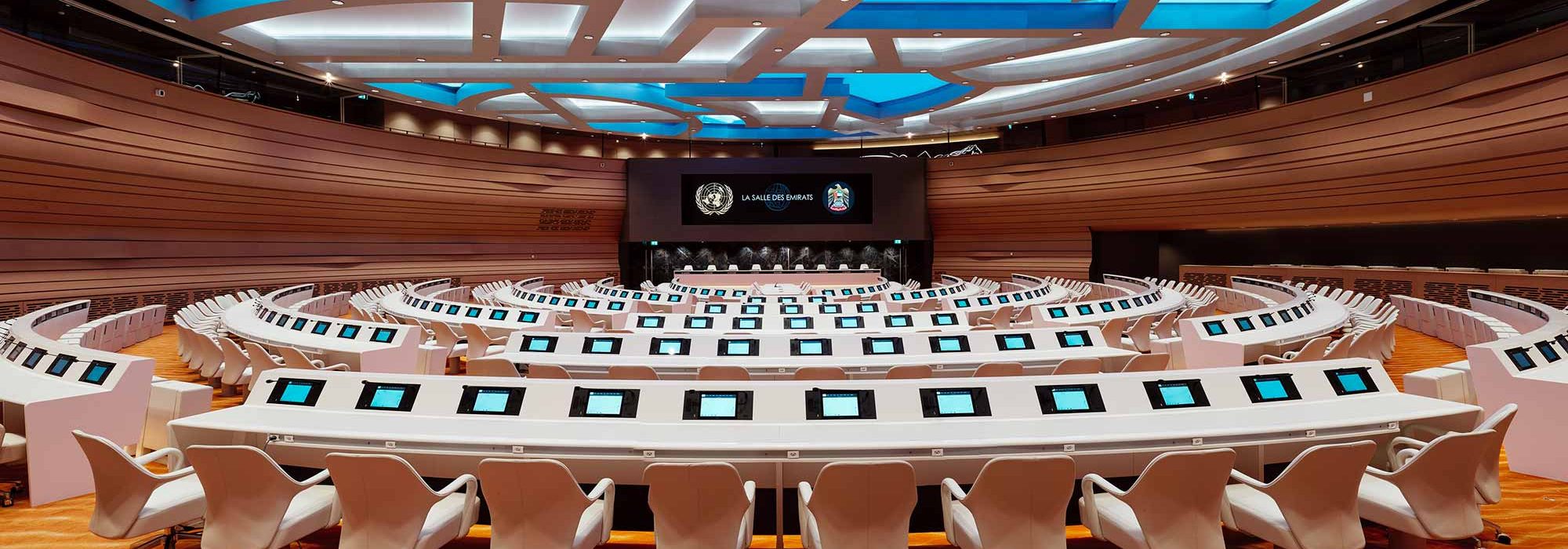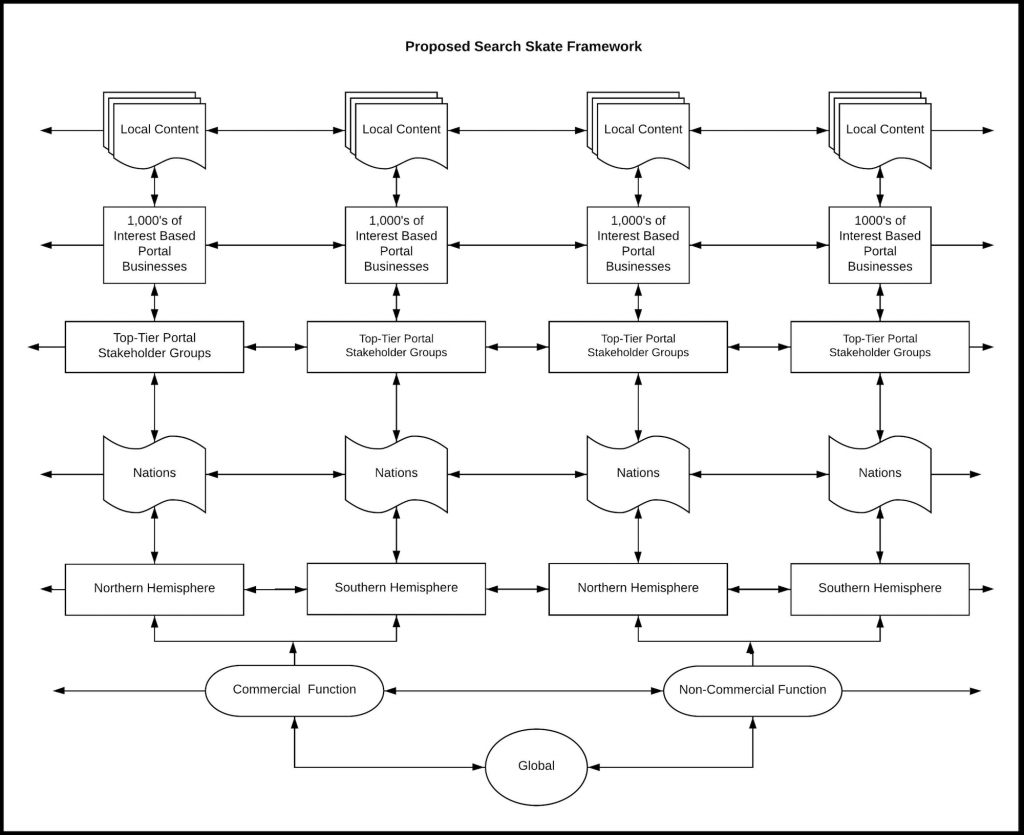
Delivering Governance
Using the direction provided by the IGF in the Global Common Framework, Search Skate integrates the local entry points in Portal Businesses with its Centralized Workflow and Service Management subsystem (CWSM). The CWSM captures the request/concern entered in a local Portal. Then it populates the concern with the time, location and category (as defined in the Framework) of the entry, identifies how many similar concerns have been submitted, associates the concern with the related regulation(s) [Observatory & Help Desk] and routes it to the appropriate Level, Stakeholder Group [Cooperation Accelerator] or Committee [Policy Incubator] for review, evaluation, discussion and resolution or escalation. The status and outcome of each individual concern is electronically monitored as it goes through the review process and reported back to the submitter. Collective reports are generated and distributed, as appropriate, to the local, regional or global (Advisory Committee) committees.
This is a straw-man example to show how Search Skate’s online system can deliver bottom-up participation, with #multistakeholder representation at every level for global #digitalcooperation. The example can be modified to reflect the needs and desires of the Internet community, national/global research community or other global governances.
Below is an example of how the Search Skate System could capture concerns reported in the CWSM, populate the concern with related necessary information, route, track and measure the review process. This example can be modified to reflect the needs and desires of the Internet community, national/global research community or other global governances.
- Local Content Level
- There are over a billion independent websites worldwide.
- Locally Owned, Interest-based Portal Business Level
- Link to related local content to bring those who share similar interests together in a locally owned, interest-based business portal, by offering an overview curated local content related to the interest area of the portal, consolidated calendars, collaboration with like-minded users and the opportunity to enter and track issues and ideas into Search Skate’s “Common Workflow/Service Management System” that’s the core of its Internet Governance System.
- Top-Tier Portal Stakeholder Groups
- Create and maintain a “Committee of Volunteers” with representation from interested connected business portals to review and mitigate differences within and across the portals regarding concerns and ideas submitted in Search Skate’s common workflow/service management system, then streamline and prioritize the initiatives to form a consolidated and representative proposal from the Stakeholder Group that is forwarded to the National Level via the “Common Workflow/Service Management System.” Online meetings are held weekly for open participation, and staffed as an Association or by an independent global Internet policy group providing administrative support for the Internet.
- National Level
- Create two (2) “Stakeholder Committees” in every nation, one for Commercial stakeholder groups and one for Non-Commercial stakeholder groups. To ensure inclusive and balanced participation, each committee is composed of one representative from each of their respective stakeholder groups, and is staffed by an independent global Internet policy group providing administrative support for the Internet. The committees meet on-line weekly to review, consolidate and prioritize recommendations submitted by their associated Stakeholder Groups regarding both national and multi-national issues. Matters that have been delegated to the nations can be addressed and resolved locally; while global concerns and multi-national issues, along with suggested solutions, are submitted to the Hemisphere Level via the “Common Workflow/Service Management System.”
- Hemisphere Level
- Create four (4) “National Committees” to review, consolidate and prioritize the “Proposals from the Nations.” To balance voices, the Northern Hemisphere and the Southern Hemisphere will each have two “National Committees;” one of national representatives of the Commercial function, and one of national representatives of the Non-Commercial function (see “Proposed Search Skate Framework” chart). The national representatives are elected by their peers for a 3-year term, with a 2-term limit, and meet on-line weekly. Each committee reviews issues in their hemisphere consolidating where possible; then prioritizing needs and estimating cost, time and scope to resolve each issue. The committee then reviews issues of both hemispheres and work to fairly prioritize the needs for both hemispheres combined. To ensure independence, the committees are staffed by an independent global Internet policy group providing administrative support for the Internet. And all four evaluations are forwarded via the “Common Workflow/Service Management System” to both the Commercial and Non-Commercial Functions.

- New Non-Commercial and Enhanced Commercial Function Level
- Create a “Non-Commercial Hemisphere Committee” with a representative from each of the top-tier stakeholder group from the Northern, and from the Southern Hemispheres. Representatives are elected by their peers at the Hemisphere Level, for a 3-year term, with a 2-term limit; and should hail from as many different geographic and interest areas as possible to ensure diverse and balanced representation. The committee reviews new and existing Non-Commercial issues, consolidating and prioritizing needs, and estimating the cost, time and scope to resolve each issue. Finally, it reviews Commercial issues to fairly prioritize the needs of the combined functions. Both evaluations are forwarded via the “Common Workflow/Service Management System” to the Global Level. Meetings are held on-line on a weekly basis, and are staffed by an independent global Internet policy group providing administrative support for the Internet.
- Create a “Commercial Hemisphere Committee” with a representative from each of the top-tier stakeholder group from the Northern, and from the Southern Hemispheres. Representatives are elected by their peers at the Hemisphere Level, for a 3-year term, with a 2-term limit; and should hail from as many different geographic and interest areas as possible to ensure diverse and balanced representation. The committee reviews new and existing Commercial issues, consolidating and prioritizing needs, and estimating the cost, time and scope to resolve each issue. Finally, it reviews Non-Commercial issues to fairly prioritize the needs of the combined functions. Both evaluations are forwarded via the “Common Workflow/Service Management System” to the Global Level. Meetings are held on-line on a weekly basis, and are staffed by an independent global Internet policy group providing administrative support for the Internet.

- Global Level
- Creates a “Non-Commercial/Commercial Committee” composed of one representative from each of the Top-Tier Stakeholder Groups, to include members from different nations in the Northern and Southern Hemispheres, and diverse interest areas. All committee members at this level must have experience in Internet governance, and be elected by their stakeholder peers for a 3-year term, with a 2-term limit. Meetings are held once a month, are publicly broadcast over the Internet and are staffed by an independent global Internet policy group providing administrative support for the Internet.
The Global Level is the final arbiter in decisions made in Search Skate’s Multi-Stakeholder Internet Governance System. All issues and recommendations presented at the Global Level have been entered into the “Common Workflow/Service Management System,” providing the public with transparent processes and trackable progress. In addition, the issues and recommendations have been reviewed, studied and prioritized by committees at the Top-Tier Stakeholder Group Level, National Level, Hemisphere Level, Commercial/Non-Commercial Function Level and now the Global Level. The Internet and the world need a Multi-Stakeholder Internet Governance System empowered to make decisions on the Internet’s direction, strategies, uses, rules, policies and the use of the funds it generates…and Search Skate’s solution delivers it.
The System goes up in months with minimal start-up costs, and creates a new Internet business model that generates a multi-billion dollar revenue stream ensuring the Internet will remain an open, interoperable and independent global public asset. Search Skate’s Multi-Stakeholder Internet Governance System is designed to be run by and for the Internet and its stakeholders. Since it is for the benefit of the world, Search Skate will license its system to the Internet at no cost.
If you want an inclusive balanced Internet participation, and input in how the Internet is run, get active! For this to happen, users from every stakeholder group and every nation need to be vocal about wanting the Search Skate System solution. Contact your favorite group or any/all of the following: the Internet Governance Forum (IGF), Multi-stakeholder Advisory Group (MAG), World Summit on the Information Society (WSIS), DiPLO, International Telecommunications Union (ITU), the Geneva Internet Platform (GIP), the Internet Society, Oxford Internet Institute, Mozilla Foundation, European Broadcasting Union, World Telecommunications Policy Forum, Berkman Klein Center for Internet & Society, Centre International Governance Innovation (CIGI) Stanford Global Digital Policy Incubator, Community Networks Africa, ASUT (Swiss Telecom Association), London Internet Exchange, Arab ICT Regulators Network (AREGNET), India School on Internet Governance, Tajik Academy of Sciences, RightsCon/AccessNow, Computer Security Incident Response Teams (CSIRTs). Let them know that you want an online Internet Governance System with a local entry point for inclusive, bottom-up participation that is balanced across stakeholder groups. Or write a blog, tell your friends, share our website on social media, and follow us Facebook and LinkedIn.

